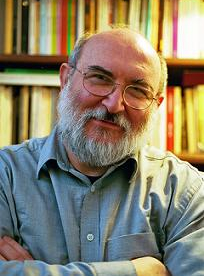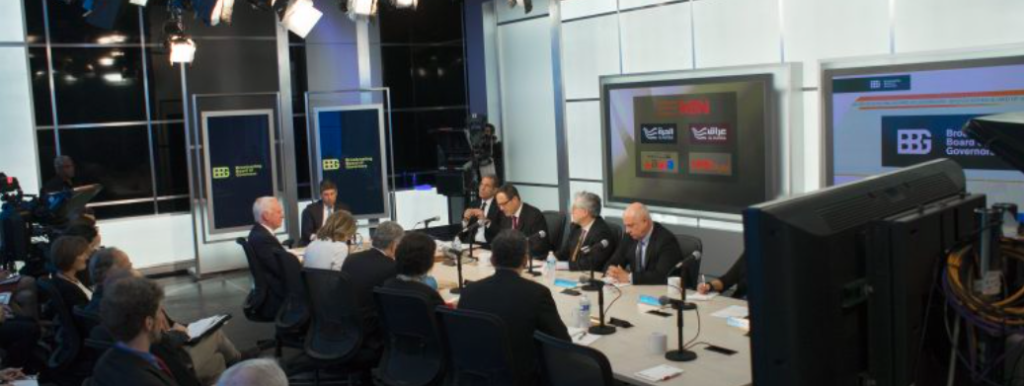OPINION
Introduction by BBG Watch
According to unconfirmed reports, Broadcasting Board of Governors (BBG) chairman Jeff Shell, BBG CEO John Lansing, new Radio Free Europe / Radio Liberty (RFE/RL) president Tom Kent, and BBG’s International Broadcasting Bureau (IBB) deputy director Jeff Trimble are to be in Moscow to mark the 25th anniversary of the opening of the Radio Liberty Moscow Bureau. There has been no official announcement of their visit to Moscow posted on the BBG or RFE/RL public relations websites.
According to one RFE/RL source, Russian Foreign Ministry officials were invited by RFE/RL to the anniversary reception which is planned to be held at one of Moscow’s hotels on July 13. It is not known whether the BBG and RFE/RL delegation will hold talks with officials of the Russian government involved in severely restricting media freedom in Russia and launching propaganda and disinformation attacks against the United States, including Russian state media attacks on RFE/RL.
BBG Chairman Jeff Shell is chairman of Universal Filmed Entertainment. It is is one of the world’s leading media and entertainment companies in the development, production, and marketing of entertainment, news, and information to a global audience. He was nominated by President Obama and confirmed by the U.S. Senate as Chairman of the Broadcasting Board of Governors on August 1, 2013. His presence is Moscow as BBG chairman on official U.S. government business may put him in a somewhat uncomfortable position if Universal Filmed Entertainment also has business interests in Russia. In the past, at least one former BBG member conducted private business talks in Russia while visiting the country on official U.S. business. While Jeff Shell is aware of these issues and it is certain that he would not mix government and private business in Russia, members of Congress of both parties have been looking at ways of reforming the BBG agency because of its numerous and continuous shortcomings, and possibly eliminating its bipartisan board altogether, or making it purely advisory.
John F. Lansing joined the BBG in September 2015 after nine years as President of Scripps Networks. He is a full time U.S. government official while BBG members only serve in part-time capacity and most of them have other full-time jobs. John Lansing has no current private business interests in Russia.
IBB Deputy Director, Jeffrey Trimble, worked for 10 years at RFE/RL, where his positions included Acting President, Counselor to the President for Programs and Policy, Director of Policy and Strategic Planning, and Director of Broadcasting. He would be the only member of the BBG delegation who occupied a top position at the agency in Washington when without any warning the former RFE/RL American management in Prague fired almost the entire journalistic staff of Radio Liberty Moscow Bureau in 2012. In response to protests from Russian and American leaders and human rights activists, including former President Mikhail Gorbachev and Lyudmila Alexeeva, a former BBG board later reversed the firing decision and charged Jeff Trimble with writing a report on the crisis. His report has never been made public.
One of the best known Radio Liberty journalists fired in 2012 and later rehired was Mikhail Sokolov. He had been instrumental in getting Boris Yeltsin to grant RFE/RL legal status in Russia. BBG Watch played a role in getting BBG board members at the time to reverse the 2012 firing decision, but most of the activity came from fired Radio Liberty journalists themselves, who created Radio Liberty-in-Exile, and their supporters among prominent Russian independent political leaders and human rights activists. One of those who signed a potion to the BBG in defense of the fired Radio Liberty team was former Russian Deputy Prime Minister and democratic opposition leader Boris Nemtsov. He was was assassinated in Moscow near the Kremlin in 2015.
READ MORE: Boris Nemtsov in Solidarity with Radio Liberty Journalists in Russia VIDEO, BBG Watch, March 12, 2015
RFE/RL President Tom Kent joined Radio Free Europe/Radio Liberty on June 27, 2016 after a career of more than 40 years at The Associated Press.
Radio Free Europe/Radio Liberty is a private, nonprofit, multimedia broadcasting corporation, funded by U.S. taxpayers, that serves as a surrogate media source in 28 languages and in 23 countries, including Afghanistan, Iran, Pakistan, Russia, and Ukraine. Its FY 2015 annual budget was $102.1 million.
###
Zygmunt Dzieciolowski, an independent Polish journalist covering Russian affairs, has written a commentary on what Radio Liberty means to Russia. He is a frequent participant in Radio Liberty programs.
Russia needs a new and reformed Radio Liberty
By Zygmunt Dzieciolowski
The 25th anniversary of the opening of Radio Liberty’s Moscow Bureau is a moment for reflection on the complex history of the U.S. taxpayer-funded media organization in the former Soviet Union and in today’s Russia. In Soviet times, Radio Liberty was in the eyes of the authorities an evil radio set up in order to destroy the communist system and to bring down the “dictatorship of the working class.” It was presented by Soviet media as a weapon used in the ideological war against the Soviet Union. Soviet newspapers referred to Radio Liberty journalists as traitors. In 1991, after five years of perestroika initiated by Mikhail Gorbachev, the Soviet empire was on the verge of collapse, but Radio Liberty still carried the stigma of being a Cold War propaganda weapon which the communist media described as being controlled by the CIA and the Pentagon. Even at the time when the USSR was about to disappear, it still took a lot of courage and determination for any Russian journalist to contact Radio Liberty or to agree to work for it.
In the late 1980s and the early 1990s, Dmitri Volchek, Andrei Babitsky, Mark Deitsch, and Mikhail Sokolov represented a small group of young journalists based in Moscow who saw Radio Svoboda as a distinguished institution which for generations was helping the Russians to get access to uncensored news. Svoboda covered the Soviet human rights movement, reported on the infighting in the Kremlin and on other political developments inside and outside the Iron Curtain.
For decades, millions of Soviet citizens spent hours searching for the right short wave radio frequency which might be less effectively jammed by the Soviet authorities to hear the voice of a Radio Liberty announcer among the buzzing noise. Gorbachev’s perestroika changed radio listening habits for good when the Soviet Union stopped jamming Radio Liberty in 1988. The station started to broadcast reports by its own correspondents based in the Soviet Union. After years of being banned, this was a revolutionary step for Radio Liberty.
There was still no Radio Liberty Bureau in Moscow when in 1990 Savik Shuster, the then deputy director of the Russian Service, approached a group of journalists working for the “Glasnost” agency (set up by famous dissident Sergei Grigoryants). They were the first ones to risk recording radio programs and reporting news for Radio Liberty. Among them were Mark Deitsch, Andrei Babitsky, and Dmitri Volchek.
Mikhail Sokolov, one of the Bureau’s veterans, recalled in his interview for the Moscow-based slon.ru website how Volchek filed reports from his private apartment and how Sokolov himself used restricted telephone lines in the parliament building assigned to the deputies of the Russian Supreme Soviet.
The Radio Liberty Moscow group achieved their first major scoop reporting on the conservative coup staged in August 1991 by the hardliners of the communist party and the special state security services who wished to stop the reform process. The Russian parliament, known as the Moscow White House, became an anti-coup resistance center. Mikhail Sokolov reported live night and day until Boris Yeltsin and his supporters prevailed over the coup leaders.
The Russian Service’s brilliant performance during that time has not gone unnoticed in Russia. The whole country was impressed. Boris Yeltsin and his people recognized the radio’s achievement and were keen on helping to legalize its status in the country. Mikhail Sokolov himself spontaneously drafted a decree which allowed Radio Liberty to work in the USSR and succeeded in getting it signed by the President of the Russian Federation. Soon the Russian Service managers, Savik Shuster and Vladimir Matusevich, had their Soviet visa ban lifted and were able to come to Moscow to set up the Bureau. They rented an office and brought to Russia all the necessary equipment. Located in the center of the city on Staropimenovsky pereulok, Radio Liberty’s Moscow Bureau began its work. The Soviet Union was replaced by the 15 independent states.
And now, 25 years later, new president of RFE/RL Thomas Kent comes to Moscow for his first visit together with the Broadcasting Board of Governors (BBG) chairman Jeff Shell, BBG CEO John Lansing, and International Broadcasting Bureau (IBB) deputy director Jeff Trimble. On Wednesday, July 13th, a reception celebrating the Moscow Bureau 25th anniversary is being planned at a Moscow hotel. Among the invited guests are the Moscow Bureau staffers, diplomats, human rights activists, and prominent journalists of other Russian media outlets.
At the time of Vladimir Putin’s crackdown on free media, the anniversary observances are a fitting gesture to remember the heroic efforts of the small group of independent and democratically-minded journalists who were instrumental in setting up the Radio Liberty Moscow Bureau in the early 1990s. They all deserve thanks for their effort even though not all of them have remained with the company. But the biggest congratulations on the 25th anniversary should go to those who are still at Radio Liberty, Dmitri Volchek and Mikhail Sokolov.
Remembering the events of the last 25 years is especially important now when Radio Liberty opens a new chapter in its history. The last few years have not been the easiest or the best for the organization. The heavy blow inflicted in 2012 by the corporation’s top American management, when nearly the entire Moscow staff was fired, has not been yet fully overcome.
During his short tenure as RFE/RL president, Kevin Klose was unable to complete the reforms. For the last two years, the corporation worked without a permanent leader. The former Russian Service director Irina Lagunina, who was appointed by Kevin Klose, tried her best but could not rebuild the Russian Services’s former reputation as a source of outstanding news and feature programs. RFE/RL has been falling under increasing control of the Washington-based BBG administration. It was really frustrating to watch Radio Liberty in 2014 when Vladimir Putin annexed Crimea and sponsored a separatist movement in the Donbas.
New RFE/RL president Thomas Kent and Russian Service director Andrei Sharyi are facing a tough challenge. It is not only the question of the Putin’s regime stifling of the free media and, in the old Soviet tradition, accusing Radio Liberty of being a propaganda weapon of the American enemy.
Radio Svoboda has to compete now with other independent Russian news and information outlets, such as Echo Moskvy, TV Rain, or Meduza.io website. Svoboda has to learn how to survive without traditional radio broadcasting, with its video and other content being transmitted on the Internet or by satellite. But this challenge represents a chance to refresh Radio Liberty’s old spirit through finding new talent and encouraging new projects. The Russian audience needs a new and reformed Radio Svoboda able to report without any censorship and offering vibrant and creative content.
About the author: Zygmunt Dzieciolowski
Zygmunt Dzieciolowski is an independent Polish journalist covering Russian affairs. He was openDemocracy Russia editor (2008-2013). He appears frequently in different Radio Liberty Russian Service broadcasts.

